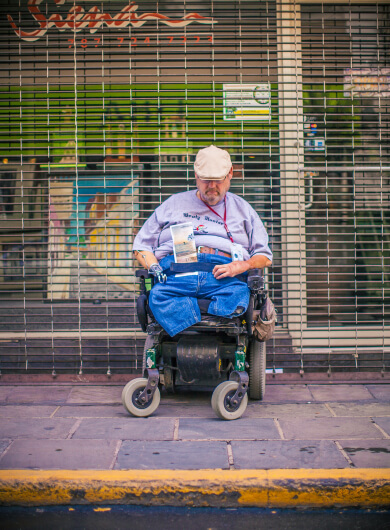According to the report, about 12% (22.6 million) of working-age adults in the United States have any disability and nearly 6 in 10 of them have only one disability type.


Joshua Stuart
According to the report, about 12% (22.6 million) of working-age adults in the United States have any disability and nearly 6 in 10 of them have only one disability type.
The Centers for Disease Control and Prevention (CDC) reports that a significant number of working-age adults in the United States live with one or more functional disabilities. These individuals often face unique challenges in their daily lives, including barriers to employment, healthcare, and social participation. However, with the right support and resources, adults with multiple disabilities can lead fulfilling lives and contribute to their communities.
Understanding Functional Disabilities
Functional disabilities are impairments that limit a person’s ability to perform everyday activities, such as walking, seeing, hearing, thinking, or caring for oneself. These disabilities can be caused by a variety of factors, including chronic illnesses, injuries, or developmental conditions.
The CDC’s research reveals that the most common types of disabilities among working-age adults are mobility disabilities and cognitive disabilities. Many individuals experience multiple disabilities, further compounding the challenges they face.
Challenges Faced by Adults with Multiple Disabilities
Adults with multiple disabilities often encounter a range of obstacles:
- Higher rates of poverty: Compared to their peers without disabilities, individuals with disabilities are more likely to live in poverty. This can limit their access to basic necessities like housing, food, and healthcare.
- Lower educational attainment: Adults with disabilities are also less likely to have completed high school or higher education, which can affect their employment prospects.
- Employment barriers: Discrimination, lack of accessible workplaces, and negative attitudes can make it difficult for people with disabilities to find and maintain employment.
- Healthcare disparities: Individuals with disabilities may experience challenges accessing appropriate healthcare, including preventative care, specialist services, and mental health support.
- Social isolation: Due to barriers to transportation, communication, and social activities, people with disabilities may experience social isolation and loneliness.
Promoting Inclusion and Empowerment
Despite these challenges, there are many opportunities to promote inclusion and empower adults with multiple disabilities:
- Accessible environments: Ensuring that workplaces, public spaces, and transportation are accessible to people with disabilities is crucial for their full participation in society.
- Inclusive education and employment programs: Supporting education and training programs specifically designed for individuals with disabilities can help them gain the skills they need to succeed in the workforce.
- Comprehensive healthcare services: Providing accessible and affordable healthcare that addresses the specific needs of people with disabilities is essential for their well-being.
- Community support networks: Building strong support networks for individuals with disabilities and their families can help them navigate challenges and thrive in their communities.
- Advocacy and awareness: Raising awareness about the rights and needs of people with disabilities can help to combat stigma and discrimination.
By addressing these issues and promoting inclusivity, we can create a society where all adults, regardless of their abilities, have the opportunity to live fulfilling lives and contribute to their communities.
Remember: Everyone deserves the chance to reach their full potential. By working together, we can create a more inclusive and equitable world for people with multiple disabilities.
Promoting Inclusion and Empowerment
Adults with multiple disabilities often encounter a range of obstacles:
- Higher rates of poverty: Compared to their peers without disabilities, individuals with disabilities are more likely to live in poverty. This can limit their access to basic necessities like housing, food, and healthcare.
- Lower educational attainment: Adults with disabilities are also less likely to have completed high school or higher education, which can affect their employment prospects.
- Employment barriers: Discrimination, lack of accessible workplaces, and negative attitudes can make it difficult for people with disabilities to find and maintain employment.
- Healthcare disparities: Individuals with disabilities may experience challenges accessing appropriate healthcare, including preventative care, specialist services, and mental health support.
- Social isolation: Due to barriers to transportation, communication, and social activities, people with disabilities may experience social isolation and loneliness.
Promoting Inclusion and Empowerment
Despite these challenges, there are many opportunities to promote inclusion and empower adults with multiple disabilities:
- Accessible environments: Ensuring that workplaces, public spaces, and transportation are accessible to people with disabilities is crucial for their full participation in society.
- Inclusive education and employment programs: Supporting education and training programs specifically designed for individuals with disabilities can help them gain the skills they need to succeed in the workforce.
- Comprehensive healthcare services: Providing accessible and affordable healthcare that addresses the specific needs of people with disabilities is essential for their well-being.
- Community support networks: Building strong support networks for individuals with disabilities and their families can help them navigate challenges and thrive in their communities.
- Advocacy and awareness: Raising awareness about the rights and needs of people with disabilities can help to combat stigma and discrimination.
By addressing these issues and promoting inclusivity, we can create a society where all adults, regardless of their abilities, have the opportunity to live fulfilling lives and contribute to their communities.
Remember: Everyone deserves the chance to reach their full potential. By working together, we can create a more inclusive and equitable world for people with multiple disabilities.
Sign up for free class
It’s easy and free!








Comments
miaqueen
It’s a great pleasure reading your post!
cmsmasters
Thanks.